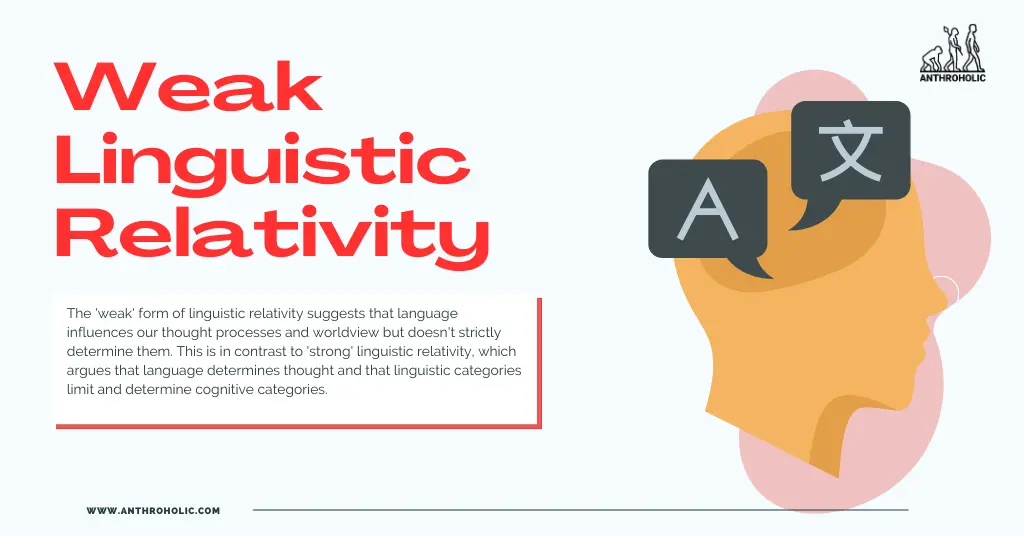AI Answer Evaluation Platform Live Now. Try Free Answer Evaluation Now
Weak Linguistic Relativity
The weak linguistic relativity suggests that language influences our thought processes and worldview but doesn’t strictly determine them. This is in contrast to ‘strong’ linguistic relativity, which argues that language determines thought and that linguistic categories limit and determine cognitive categories.

Key Features of Weak Linguistic Relativity
- Language serves as a tool that can influence thought but doesn’t dictate it.
- Cognitive processes can still function independently of linguistic processes.
- Language can shape certain habitual thought patterns, but it doesn’t restrict the possibility of other forms of conceptualization.
Evidence and Studies Supporting Weak Linguistic Relativity
Multiple studies and experiments have shown that language can influence cognition, thus supporting the weak form of linguistic relativity.
The Color Perception Studies
Berlin and Kay’s cross-cultural study in 1969 found that there are universal patterns in color naming across languages. They did, however, find slight differences in how speakers of different languages categorized color shades, pointing to a weak form of linguistic relativity.
Spatial Relation Studies
Levinson’s research in 1996 with the Guugu Yimithirr community showed that the absolute geographical terms used in their language subtly influenced their spatial cognition and navigation abilities, providing another example of weak linguistic relativity.
Implications of Weak Linguistic Relativity
Weak linguistic relativity implies that our language subtly shapes our worldviews and cognitive processes, but it doesn’t confine them. This principle has several implications:
Cross-Cultural Understanding
Weak linguistic relativity can inform cross-cultural understanding and communication. By recognizing the influence of language on thought, we can be more empathetic and open-minded when encountering different perspectives and ideas.
Language Education
The understanding of weak linguistic relativity can contribute to more effective second-language teaching methodologies. Realizing that learning a new language also involves adopting a new way of thinking can help educators devise more holistic language teaching approaches.
Cognitive Science
Weak linguistic relativity also influences cognitive science, particularly in understanding how cognitive processes can be shaped and adapted in multilingual individuals.
Controversies around Weak Linguistic Relativity
Despite the consensus, weak linguistic relativity is not without controversy. Some researchers believe that the influence of language on thought is negligible, while others argue that the effects are significant but difficult to measure. More empirical research is needed to clarify these points of contention and refine our understanding of weak linguistic relativity.
Criticisms and Counter Arguments
While there is considerable evidence supporting the weak form of linguistic relativity, it has not escaped criticism.
- Absence of Direct Causal Link: Critics argue that the connection between language and thought is correlative rather than causative. The differences in cognition may be due to cultural factors, not language itself.
- Difficulty in Testing: It is challenging to design experiments that directly test the weak form of linguistic relativity. Separating language influence from other cultural factors is complex and can lead to confounding results.
Current Consensus and Future Directions
Despite the criticisms, the current consensus leans towards a weak form of linguistic relativity. Linguists and anthropologists widely acknowledge that language can subtly influence thought processes without strictly dictating them. This view allows for the coexistence of universal cognitive processes and language-specific influences.
There is a growing interest in understanding how these language-specific influences work, with areas of focus including:
- The role of linguistic relativity in bilingualism and multilingualism.
- The influence of new communication forms (e.g., emojis, internet slang) on cognitive processes.
Conclusion
From an anthropological perspective, the weak form of linguistic relativity offers a balanced view that acknowledges the influence of language on thought without overstating its power. More research is required to fully understand this complex interplay, but the progress so far suggests a promising future for this field of study.
Table 1. Comparison of Strong and Weak Linguistic Relativity
| Strong Linguistic Relativity | Weak Linguistic Relativity | |
|---|---|---|
| Belief | Language determines thought | Language influences thought |
| Limitations | Linguistic categories limit cognitive categories | None, cognitive processes can function independently |
| Supporting Studies | Few, if any | Multiple, including color perception and spatial relation studies |
References
- Whorf, B. L. (1956). Language, Thought, and Reality: Selected Writings.
- Gumperz, J. J., & Levinson, S. C. (1996). Rethinking Linguistic Relativity.
- Lucy, J. (1992). Language Diversity and Thought.
- Berlin, B., & Kay, P. (1969). Basic color terms: Their universality and evolution.
- Levinson, S. C. (1996). Language and space.




